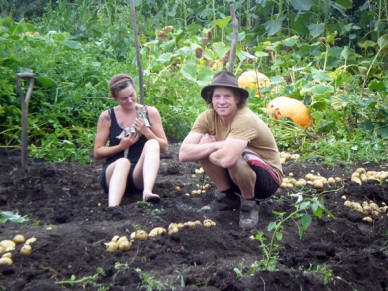Starting with self-sufficiency

Today it can seem unimaginable to leave everything behind and lead a more self-sufficient lifestyle. Smartphones, cars and constant food, water and energy supplies have all contributed towards an existence that is reliant upon these things every day and night; without them, we would probably struggle to live our lives in a way that felt comfortable.
There are ways that we can introduce self-sufficiency into our lives without compromising the quality of our life. One way of doing this is going off-grid. By replacing energy and water supplies from the main grid for renewable alternatives, this way of living offers a sustainable alternative to a lifestyle where everything we need is available to use 24/7. Together with gas company Flogas, we take you through exactly how living off-grid can be easier than you think:
Sourcing power from elsewhere
If you do decide to remove yourself from the grid, you will have to source another energy supply to power your home. Solar energy is a reliable form of power that can produce around 3,400kWh of free electricity every year.
The power needed to fuel energy for a family home depends on what size family you have. If you have small children, then a 3kW to 4kW solar panel system will produce the required amount of energy for a family home, whereas a 2kW to 3kW solar panel will produce enough energy for smaller homes with less people living in them. A 3kW overall solar system will cost around £5,000 – £6,000 and will be a sound investment based on the amount of free electricity you will procure during its lifetime.
A back-up energy supply will also be necessary. This could be installed in the form of a generator or gas cylinder. Alternatively, domestic wind turbines can also be installed to produce 5kW to 6kW of energy – you will be paid for any energy that you don’t use, which is sent back to the grid.
What else should you consider?
If you are relying on energy supplies that are off-grid, you must ensure that you only use the energy that you need. To keep energy costs low and to live within your own budget, LED bulbs should be used to replace incandescent bulbs – helping to reduce electricity costs by 75%; aim to get rid of any electrical appliances that you don’t need, and make sure that all electrical appliances are turned off at the mains once they have been used.
How to drain correctly
If you do not live near a clean, natural source of water, you will need to supply your own water. A well can cost anything between £10,000 – 20,000, and this is dependent upon how deep the well is dug, and whether the well will be used as a source of drinking water or for other domestic purposes.
In the case of a lack of sewage system, a septic tank will need to be installed. This sewage tank will need to be emptied periodically by a vacuum truck so that it is disposed of safely. As well as this, a greywater system should also be installed; by treating water used in dishwashing, sinks, showers and baths, this water can be used again. This also benefits the lifespan of your well, as you can reuse water that has already been cleaned and brought to the surface.
Smaller lifestyle changes
If going off-grid completely is not the lifestyle for you, there are alternative ways that you can be more self-sufficient and environmentally conscious.
Eliminating waste
You should be monitoring and maintaining your food, energy and water usage. There are ways to keep on top of this waste, such as by…
• Keeping showers short.
• Only using artificial lighting when it is completely dark.
• Turning off lights after exiting a room.
• Using food leftovers for compost to create a rich soil for growing more fruit and vegetables.
• Attend workshops that allow you to learn more about how to repair any damages to the home, or how to cultivate land for agricultural practices.
• Adopt techniques such as hunting and fishing so as to catch fresh food, helping to reduce your reliance upon supermarkets that you would usually have to drive to.
Features categories
Most recent Features articles
- Starting with self-sufficiency 05th December, 2017 , sel sufficiency
- Smallholding in Ireland 15th September, 2015
- Applying vintage tools in the 21st century 12th July, 2015
- Product review: Norfolk Chicken Barn ‘Ecoflex’ poultry house 07th August, 2014
- Eastern Promise: Smallholding and self-sufficiency in Bulgaria 07th July, 2014
- Ragwort: menace or maligned? 22nd May, 2014







Leave a reply